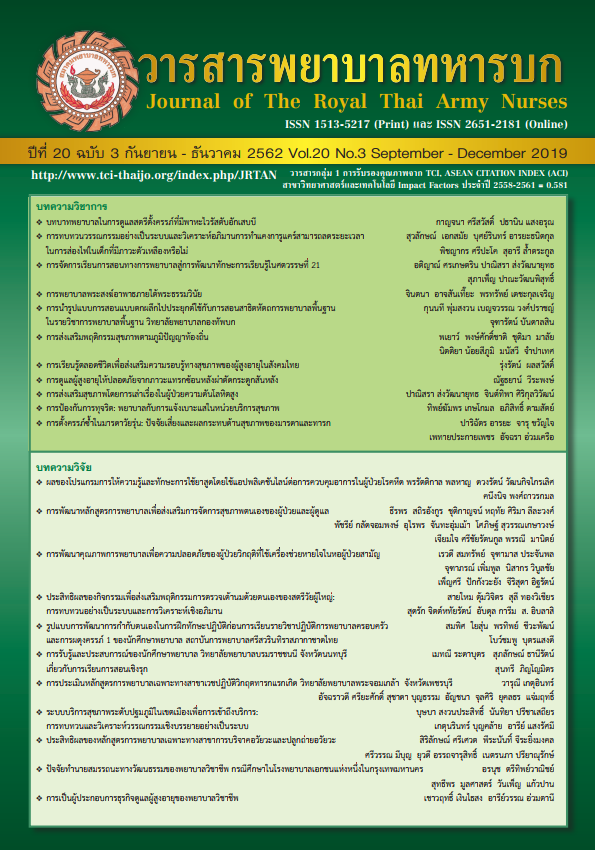Care Service Model for Dependent Older Persons in Long-Term Care Institution in Thailand
Keywords:
care service model, dependent older adults, long-term care institutionAbstract
The qualitative research was to explore the care service model for dependent older persons in long-term care institution in Thailand. Forty-eight participants who experienced managing care for dependent older persons were involved in the northern, the northeastern, the southern, the central and Bangkok Metropolitan region. Data collection included focused-group discussion with observation on providing service in government and private settings and secondary data such annual report, the activities and the documents which permitted. Those were hospitals, nursing homes, welfare homes, and the foundation homes. Content analysis was used to analyze data.
Findings included: 1) Three formal long-term care service model of institution were the welfare homes for older adults/ the private foundation homes, the private nursing home, and the government and private hospital. The characteristics of care services were health care issues. The care service model of welfare homes for older adults/ the private foundation homes focused on social care. The initiative objective was to assist older adults who were homeless and lacked of caregivers. Later, when the health care needs of older adults had been increased, providers improved care services along with changed care needs. For the private nursing home, the beginning phase was to manage care for older adults who took less self-care; and then an increase of care management with care needs was granted. In contrast, the long-term care service model of the hospitals emphasized health care management of older adults with dependent care. 2) Care service management in long-term care institutions were the assessment for classification of older adults, physical health management, and social care and social welfare. All the services were organized by using experiences and learning from the examples of the institution in Thailand or abroad. The care standard deepened on their perceptions and their institutions, not specify for long term care institution. Suggestions included the long-term care system should be improved to meet care standard, dependent older adults’ needs, and Thai socio-culture surrounding
Downloads
References
2. Department of health. Care homes for older people national minimum standards and the care homes regulation 2001. 3rd ed. Landon: TSO; 2006.
3. Sasat S. Pakdeeprom T. Nursing home system. J Demograph 2009;25(1):45-62. (in Thai).
4. Sasat S. Choowatanapakorn T. Leudrat P. A complete report of the model of care for older adults in the long-term care institutes in Thailand. Bangkok: Health System Research Institute; 2009. (in Thai).
5. Department of older person. The elderly act. Bangkok: Department of older person; 2003. (in Thai).
ุ6. Department of health and human services. Overview of long-term care in five nations: Australia, Canada, the Netherlands, Norway and the United States. UK: Department of health and human services; 1995.
7. Bundhamcharoen K. Sasat S. Long-term care: Comparative analysis for policy recommendation. Rama Nurs J 2008;14(3):385-99. (in Thai)
8. Patton M.Q. Enhanching the quality and credibility of qualitative analysis. Health Services Res 1999;34(5):1189-1208.
9. Sridhamrongsawat S. Bundhomcharoen K. Sasat S. Amnatsatsur K. The model of health care for older adults in long-term care by community. Thai J Prim care Fam Med 2009;1(2):22-31. (in Thai).
10. Wirogratana V. Amnatsatsue K. Sasat S. Malathum P. Narongsak J. Improvement of health care services for dependent elders. Thai J Nurs Counsil 2014; 29(3):104-15. (in Thai).
11. C. D. Howe institute. Long-term care for the elderly: Challenges and policy options. Canada: C. D. Howe institute; 2015.
12. Canadian institutes for health research. A systematic review of research evidence on nurse staffing in long-term care. Canada: CIHR; 2010.
13. Sasat S. Wisesrith W. Sakunphanit T. Soonthornchaiya R. The development of care standard and service guideline for dependent older persons in long-term care institution. Nonthaburi: Mata publisher; 2015. (in Thai).
14. Harington C. Goldman M. Choiniere J. Jacobsen F. Nursing home staffing standard and staffing levels in six counties. J Nur Scholarship 2012;44(1):88-98.
15. Tatara K. Okamoto E. Japan: Health system review. Health System in Transition 2009;11(5):1-164.
16. Mot E. The long-term care system for the elderly in the Netherlands. The Hague, Netherlands: CPB Netherlands bureau for economic policy analysis; 2010.
17. Chung S. Y. Chiu A. D. The 10 years’ experience in residential home aged care accreditation scheme (RACAs) in Hong Kong. Hong Kong: RACAs; 2014.
18. Hong Kong association of gerontology (HKAG). Report on “Pilot project on accreditation system for residential care services for the elders in Hong Kong. Hong Kong: HKAG; 2004.
19. Organization for economic co-operation and development. Help wanted? Providing and paying for long-term care. Paris: OECD; 2011.
20. Mahaweranon I. Thanasilp S. Chimluang J. Factors related to supportive care needs in family caregivers of patients with advanced cancer. Journal of The Royal Thai Army Nurses 2019;20(1):92-100. (in Thai).
21. Soliluk U. Wisessrith W. Effects of case management combined with palliative care model in patients with metastatic cancer on length of stay and quality of
nursing care. Journal of The Royal Thai Army Nurses 2017;18(Suppl): S68-S75. (in Thai)
Downloads
Published
How to Cite
Issue
Section
License
บทความหรือข้อคิดเห็นใดใดที่ปรากฏในวารสารพยาบาลทหารบกเป็นวรรณกรรมของผู้เขียน ซึ่งบรรณาธิการหรือสมาคมพยาบาลทหารบก ไม่จำเป็นต้องเห็นด้วย
บทความที่ได้รับการตีพิมพ์เป็นลิขสิทธิ์ของวารสารพยาบาลทหารบก
The ideas and opinions expressed in the Journal of The Royal Thai Army Nurses are those of the authors and not necessarily those
of the editor or Royal Thai Army Nurses Association.






